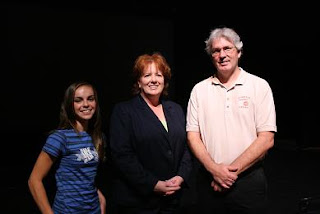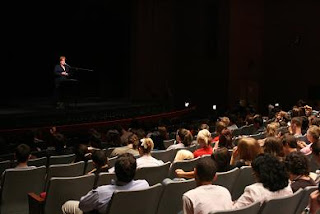On November 27th - 30th I had the pleasure of attending the
NEC College Convention in New Hampshire. Every presidential election year, college students gather in large numbers to learn more about the issues that are being discussed during the campaigns and to meet the candidates directly. Unfortunately, this year because of they way the primaries were scheduled, the convention had to take place during the month of November as opposed to in January, when it has traditionally taken place. As a result, there were not as many students and colleges as they would have liked. After all, this is the prime exam and final paper period for college students so I am sure that it was very hard for most people to make the trip.
Even though the numbers were low, I was still able to meet a lot of great people, some of the presidential candidates, attend some issue specific workshop, and help lead some workshops. On Wednesday, I manned a table at the Opportunity Fair, where I spoke with about twenty people, most of whom were in high school. After giving them the rundown on Democracy Matters and the money in politics issue, some of them even signed form letters to their senators asking them to support the Fair Elections Now Act. I was able to get 11 people in all to send letters.

The first workshop that I helped lead was called, "Student Organizing on Campuses," and I co-facilitated it with Maya Enista from
mobilize.org and Ian Storrar from
Common Cause. We had a great discussion with the 15 or so students who attended. We talked about there responses to the following two questions: 1. How frustrated are young people (15-30) about political issues that affect their lives (education, environment, health care, civil rights, the War in Iraq, etc.)? and 2. How political active and engaged are young people (15-30)? The interesting thing about these responses is the disconnect that was apparent. Essentially, students feel like their peers are frustrated and care a lot about a variety of issue but at the same time feel like they are not politically active. In an ideal world your level of political engagement would match your level of concern about specific issues. We talked about how the reason for this disconnect is the fact that money in politics makes our democracy an unfair process and turns people cynical. Until we address the money in politics issue, people will continually feel cynical and turned away by their own government. The students at the end felt like this was the best workshop they had attended during the convention. Sometimes people just want to share their own experiences and the learning comes from that.
The other workshop I helped out with was, "Public Financing of Campaigns: How Students Can Bring About Change." This was moderated by Dan Week from
Just6Dollars.org. There were a lot of people on the panel. Not too many people attended this one, unfortunately, due to a dead time during the day. We did get a few people to sign and send some form letter though.
I attended two workshops: one was about forgiven foreign debt and the other was about health care. The foreign debt one was facilitated by two poeple from
Jubilee USA Network, which is advocated for all foreign debt to be forgiven to the 67 most highly indebted developing countries. The other workshop was facilitated by
New Hampshire for Health Care. The interesting bit of information I learned from this workshop is that the largest and fastest growing population on uninsured people are between the ages of 19-24.

Finally, I was able to ask some of the presidential candidates and/or the representatives questions about money in politics and the Fair Elections Now Act. First, I asked
Joe Biden the following question: "Senator Biden, your life story is a testament to the fact that young people do care about a variety of political issues and that they can look to public service as a way to affect change, but a lot has change since you first won a senate seat at the age of 29. Young pepple look at policy that just doesn't make sense anymore: an expensive and deadly war that gives away billions of contracts to private firms like Halliburton and Blackwater, billions of dollars of farm subsidies that go to large corporate agribusinesses instead of family farms, and our efforts to bring about sound environmental policy is constantly being stonewalled by the big oil and gas industries. The one thing that ties all these things together is money in politics. How has the issue of money in politics changed since during your time in office and what are you doing to bring about a system of full public financing so we can make get big money out of politics?" The first words out of his mouth were, "This is the single most important issue you can focus on because, as you said, it affects everything that is done in Congress. Don't expect any significant policy changes until we can ensure that money no longer determines policy."
The second person to which I was able to ask a question was
Senator Lindsey Graham who was there to represent
John McCain. I praised him and McCain for being bi-partisan leaders in the Senate and working across the aisle, something that we need more of. Since John McCain a co-sponsor of the Bi-Partisan Campaign Reform Act of 2002 (BCRA) I asked if the two of them would be willing to take the next step to curb the big money influence in politics and support the Fair Elections Now Act. Senator Graham said that he was not in favor of full public financing, although his reasons for supporting BCRA are the very reasons the Fair Elections Now Act is needed. So I think he may be able to make a turn around.

I also got to ask Tom Tancredo a question about immigration; essentially calling him out for demonizing immigrants and turning the work immigrant into a bad work and how he does a disservice to himself and the debate by doing such things. Ian Storrar from Common Cause got Mike Gravel to sign the public financing pledge. And I got to see Ben Cohen (from Ben and Jerry's Ice Cream) give his
presentation on the bloated Pentagon spending in the federal budget and his famous
Oreo presentation.
All in all, this was a great experience. I wish there had been more students there but what are you going to do.
-peace-
Daryn Cambridge
Assistant Director
The Democracy Matters Institute
 From November 28th through November 30th, several members of Democracy Matters as well as personal friends of Jessie Vogel (one of our members) wore 10 different backpacks around campus. Each backpack illustrated a different political issue, from stem cell research to gay marriage to the war in
From November 28th through November 30th, several members of Democracy Matters as well as personal friends of Jessie Vogel (one of our members) wore 10 different backpacks around campus. Each backpack illustrated a different political issue, from stem cell research to gay marriage to the war in  Finally, the project got a lot of good press. Unfortunately, in most cases, the reporters were more interested in the artistic side of the project, so Democracy Matters is not central in any articles. The project was also featured in two TV news stories, and in at least one of these, they did include Jessie talking about Democracy Matters and its goals. (I was unable to watch the other bit.) The Winston-Salem Journal ran a piece on the project that appeared on the front of local section and included several full color pictures (the online version is here). Also, the Window on
Finally, the project got a lot of good press. Unfortunately, in most cases, the reporters were more interested in the artistic side of the project, so Democracy Matters is not central in any articles. The project was also featured in two TV news stories, and in at least one of these, they did include Jessie talking about Democracy Matters and its goals. (I was unable to watch the other bit.) The Winston-Salem Journal ran a piece on the project that appeared on the front of local section and included several full color pictures (the online version is here). Also, the Window on 













.JPG)
.JPG)